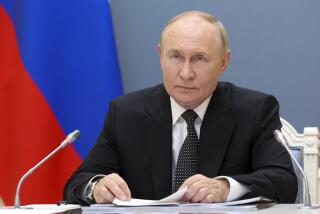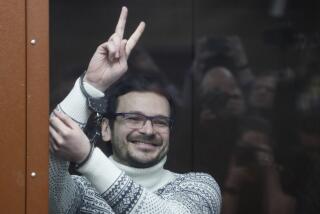Freed Yeltsin Foes Signal Future Tumult : Russia: Amnesty gave opposition moral victory, analysts say. They see president weakened.
MOSCOW — Just hours after President Boris N. Yeltsin’s worst political foes got out of jail under a special amnesty, some were already sending signals Sunday of the opposition-run turmoil they could unleash on Russia.
Viktor I. Anpilov, the hard-line Communist who organized many Moscow street protests, gathered a few hundred supporters before the Bolshoi Theater and called for the creation of a powerful new working-class party.
“My first task will be to raise workers’ collectives to fight against the regime,” he told the Interfax news agency.
Alexander V. Rutskoi, the former vice president who pronounced himself Russia’s leader during the anti-Yeltsin rebellion in October, will most likely run for president, aide Andrei Fyodorov told the British news agency Reuters.
And Ilya V. Konstantinov, head of one of the opposition groups that spearheaded the violent resistance, said he would remain its leader. “I was and remain the chairman of the National Salvation Front,” he told the Russian NTV network.
However, Ruslan I. Khasbulatov, the former Parliament chairman, said he did not plan to take up politics again, saying he “greatly loathed contemporary politicians.” He told Interfax there are no political leaders “with whom it is possible to agree with on any matter.”
Russian analysts said the Parliament-approved amnesty, which freed all those facing charges for their roles in the 1991 Soviet coup attempt and the October clashes, hurt Yeltsin not only because the released prisoners could prove dangerous but also because it gave the opposition a resounding moral victory.
“This is undoubtedly a blow to Yeltsin, but the point is not the release of those particular people,” said Nikolai Svanidze, a Russian Television commentator. “The fact of their release and that the president couldn’t oppose it in any way speaks to the fact that he is weaker than he was some time ago.
“The president now is once again in a state of disarray, and the moral advantage is definitely on the side of the opposition,” Svanidze said.
That disarray could reach startling levels. In a glimpse into how the Kremlin works--or does not work, as the case may be--two presidential advisers admitted on NTV on Sunday night that the release of Yeltsin’s foes from Lefortovo Prison on Saturday afternoon had taken them by surprise.
The country’s top prosecutor had led them to believe that nothing could happen before today, they said. So they began to work with the Duma, the lower house of Parliament which had approved the amnesty on Wednesday, by challenging the legality of its decision and asking that it be suspended.
But as aides Georgy Satarov and Yuri Baturin were meeting with the head of the Duma on Saturday, the Lefortovo prisoners were already stepping through the prison’s gates and heading home, released on order of the prosecutor’s office.
“In household language, that’s called deception,” Satarov fumed.
Satarov and Baturin actually appeared more upset about the poor coordination in their administration than about the possible political consequences of the amnesty.
If he were to calculate cynically, Satarov said, he might even argue that the release of the October rebels could work in Yeltsin’s favor, because while they sat in prison they were replaced on the political scene by a far more appealing opposition that could present greater problems for the president.
“But this cynical calculation is, unfortunately, less significant here because we cannot ignore their political practices, which are simply dangerous for the people and the country,” Satarov added.
When Yeltsin declared the old Parliament dissolved last fall, Rutskoi and leading deputies refused to yield. They eventually called for armed attacks on government buildings, which led Yeltsin to storm their White House headquarters with tanks and artillery. The released prisoners are expected to rely once again on “the street”--mass protests and marches.
Some Russian politicians have urged Yeltsin to demand some kind of guarantee from the October rebels that they will refrain from political activity for a spell.
However, legal experts say that would deny the released prisoners their constitutional rights as citizens of a democracy.
More to Read
Sign up for Essential California
The most important California stories and recommendations in your inbox every morning.
You may occasionally receive promotional content from the Los Angeles Times.










